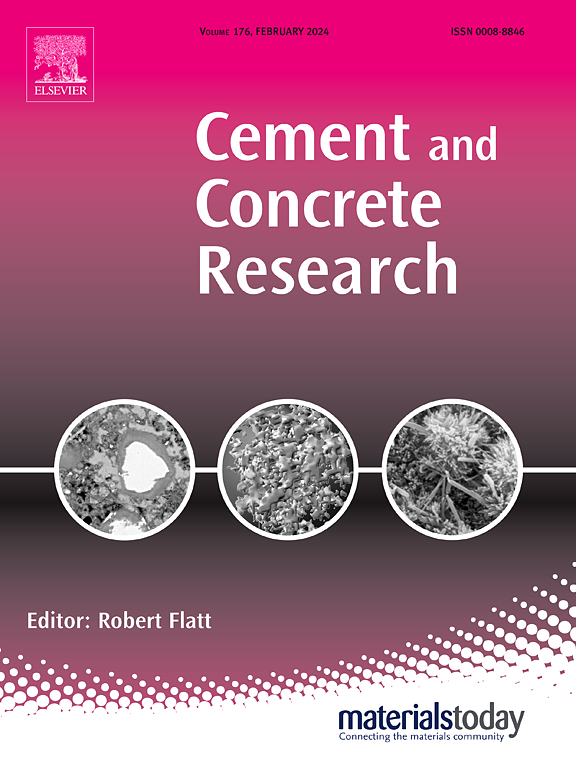Hourly three-minute creep testing of an LC3 paste at early ages: Advanced test evaluation and the effects of the pozzolanic reaction on shrinkage, elastic stiffness, and creep
IF 10.9
1区 工程技术
Q1 CONSTRUCTION & BUILDING TECHNOLOGY
引用次数: 0
Abstract
In this study, hourly three-minute creep testing is used to elucidate the evolution of the viscoelastic behavior of cement pastes produced with ordinary Portland cement (OPC), limestone Portland cement (LPC), and limestone calcined clay cement (LC3), from 1 to 7 days after production. An innovative test evaluation protocol, accounting for shrinkage, is used to identify values of the elastic modulus, the creep modulus, and the creep exponent, without making assumptions. The S-shaped shrinkage evolution of the LC3 paste is explained by Portlandite dissolution and the associated redistribution of chemical shrinkage-induced compressive stresses to the remaining solid skeleton. The evolution of the elastic stiffness of the LC3 paste is explained by space filling by C-A-S-H phases. The small creep compliance of the LC3 paste is explained by C-A-S-H which creeps less than C-S-H, and by AFm phases which precipitate in nanoscopic slit pores between C-S-H structures, gluing viscous interfaces.
LC3 浆料在早期龄期的每小时三分钟蠕变测试:先进的测试评估以及胶凝反应对收缩、弹性刚度和蠕变的影响
本研究采用每小时三分钟的蠕变试验来阐明用普通硅酸盐水泥(OPC)、石灰石硅酸盐水泥(LPC)和石灰石煅烧粘土水泥(LC3)生产的水泥浆在生产后 1 到 7 天内的粘弹性行为演变。在不做任何假设的情况下,采用一种考虑收缩的创新测试评估方案来确定弹性模量、蠕变模量和蠕变指数值。LC3 浆料 S 形收缩演变的原因是波长岩溶解以及化学收缩引起的压应力在剩余固体骨架上的重新分布。LC3 浆料弹性刚度的演变可通过 C-A-S-H 相的空间填充来解释。LC3 浆料的蠕变顺应性较小,原因是 C-A-S-H 的蠕变小于 C-S-H,以及 AFm 相在 C-S-H 结构之间的纳米缝隙孔隙中析出,粘合了粘性界面。
本文章由计算机程序翻译,如有差异,请以英文原文为准。
求助全文
约1分钟内获得全文
求助全文
来源期刊

Cement and Concrete Research
工程技术-材料科学:综合
CiteScore
20.90
自引率
12.30%
发文量
318
审稿时长
53 days
期刊介绍:
Cement and Concrete Research is dedicated to publishing top-notch research on the materials science and engineering of cement, cement composites, mortars, concrete, and related materials incorporating cement or other mineral binders. The journal prioritizes reporting significant findings in research on the properties and performance of cementitious materials. It also covers novel experimental techniques, the latest analytical and modeling methods, examination and diagnosis of actual cement and concrete structures, and the exploration of potential improvements in materials.
 求助内容:
求助内容: 应助结果提醒方式:
应助结果提醒方式:


